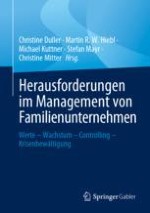2023 | OriginalPaper | Buchkapitel
Einfluss von religiös geprägten Werten auf das Krisenmanagement von Familienunternehmen
verfasst von : Melanie Lubinger, Johannes Thaller, Stefan Mayr, Sarah Pieslinger
Erschienen in: Herausforderungen im Management von Familienunternehmen
Verlag: Springer Fachmedien Wiesbaden
Aktivieren Sie unsere intelligente Suche, um passende Fachinhalte oder Patente zu finden.
Wählen Sie Textabschnitte aus um mit Künstlicher Intelligenz passenden Patente zu finden. powered by
Markieren Sie Textabschnitte, um KI-gestützt weitere passende Inhalte zu finden. powered by
